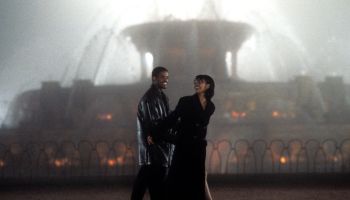No Country for Our Men
Two black men died untimely deaths in the last two weeks. One, Michael Clarke Duncan, was a major movie star known to millions as John Coffey in “The Green Mile,” the other, music manager Darrell “Baby Chris” Lighty, was well known to the music industry but not as much of a public figure. The two died on separate coasts, and were exactly 10 years apart in age, but their success and untimely deaths united them. Duncan died at age 54 of a heart attack, leaving behind a grieving fiancée in reality star Omarosa Manigualt. Lighty died at age 44 by his own hand, shooting himself outside his Bronx, N.Y. apartment after an argument with his wife Veronica. He leaves behind six children.
While we don’t yet know what caused Duncan’s heart attack, his death came as a surprise. The 6’5 inch star was known for his fitness and had recently embraced a vegetarian, organic diet, which he tweeted about enthusiastically before his death. Lighty, who managed Mariah Carey, 50 Cent, Diddy, Diggy Simmons and Ja Rule among others, helped hip-hop stars close unprecedented product endorsement deals through his Violator Management. Those deals, like the multimillion dollar one signed between 50 Cent and Vitamin Water, helped hip hop stars gain alternate streams of revenue aside from their musical output, something that became increasingly important as music sales diminished.
Lightly left no note and his estranged wife says that although she had filed for divorce, she’d withdrawn the filing and that neither their marriage or the IRS problems Lighty was facing were the reasons for his despair. In an interview with The New York Daily News, Veronica Lighty said her husband was dealing with unspecified stresses and that he had “a lot of weight on his shoulders.”
Black men, no matter how successful, often do have stress. No matter how enviable their lives look from the outside looking in, even wealthy and famous black men deal with demons and the everyday racism that infects their lives. Take President Obama, for example. There is documented evidence that his historic presidency has been overshadowed by negative spin by the opposing party and the news media in ways that other (White) presidents haven’t faced. While Obama seems to handle the slights with ease and humor, behind closed doors the nastiness and racism he’s dealt with must be difficult to absorb.
Duncan seemed to be a happy man, but that’s the image he showed to the world. He and Manigualt were enjoying a good relationship and had plans to be married, but who truly knows what else was pressing on him? Was there pressure to take on more roles to make money or internal pressure around staying successful in a very challenging industry? Was he pushing himself harder to stay in shape given that many of his roles depended on his dominating physique? Did he ignore signs of illness because he wanted to get that next part? Duncan worked steadily in the last decade and at the time of his death he had three films in various stages of production. The music business is assuredly a difficult one requiring long hours and the capacity to deal with difficult and demanding personalities. A blog post Lightly wrote from 2010 says that he typically works 16-18 hour days and that trying to juggle his family, business and wife wasn’t easy.
We need to pay more attention to the emotional needs of Black men because it has such a significant impact on their health. Sometimes success only exacerbates those issues because of the increased demands that family, friends, and a career place on the person doing well. Black men die younger and suffer disproportionately from preventable diseases. Heart disease is preventable. Suicide is preventable. Even though slavery was eradicated almost 150 years ago, Black men remain the most demonized men on the planet. Yes, there are abusive, immature, violent, angry, arrogant Black men who prey on women and leave their children behind. But many men are dealing with a world and a community that is not equipped to care for them emotionally. Because of their wretched history in this country, Black men have learned to equate emotions (other than anger) with weakness. If we can’t find a way for them to express the full gamut of human feeling, we will continue to lose them. Stress and bottled-up feelings are silent killers of Black men, who have to begin to value themselves enough to get and stay healthy, both in their minds and their bodies. Without that, we will continue to mourn them, continue to bury them and continue to lose their significant contributions to our lives, our families and the world.















